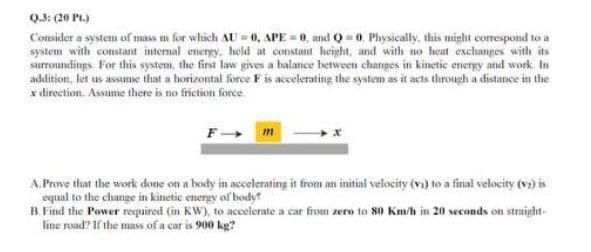rove that the work done on a body in accelerating it from an initial velocity (v) to a final velocity (v2) is qual to the change in kinetic energy of bodyt ind the Power required (in KW), to accelerate a car from zero to 8o Kmh in 20 seconds on straight- me road? If the mass of a car is 900 kg?
rove that the work done on a body in accelerating it from an initial velocity (v) to a final velocity (v2) is qual to the change in kinetic energy of bodyt ind the Power required (in KW), to accelerate a car from zero to 8o Kmh in 20 seconds on straight- me road? If the mass of a car is 900 kg?
Chapter3: The First Law Of Thermodynamics
Section: Chapter Questions
Problem 51P: A monatomic ideal gas undergoes a quasi-static process that is described by the function...
Related questions
Question

Transcribed Image Text:Q.3: (20 PL.)
Consider a system of mass m for which AU = 0, APE = 0, and Q = 0. Physically, this might correspond to a
system with constant internal energy, held at constant height, and with no heat exchanges with its
surroundings. For this system, the first law gives a balance between changes in kinetic energy and work. In
addition, let us assume that a horizontal force F is accelerating the system as it acts through a distance in the
x direction. Assume there is no friction force.
F-
m
A. Prove that the work done on a body in accelerating it from an initial velocity (vi) to a final velocity (v) is
equal to the change in kinetic energy of bodyt
B. Find the Power required (in KW), to accelerate a car from zero to 80 Km/h in 20 seconds on straight-
line road? If the mass of a car is 900 kg?
Expert Solution
This question has been solved!
Explore an expertly crafted, step-by-step solution for a thorough understanding of key concepts.
Step by step
Solved in 2 steps with 1 images

Recommended textbooks for you


Principles of Physics: A Calculus-Based Text
Physics
ISBN:
9781133104261
Author:
Raymond A. Serway, John W. Jewett
Publisher:
Cengage Learning


Principles of Physics: A Calculus-Based Text
Physics
ISBN:
9781133104261
Author:
Raymond A. Serway, John W. Jewett
Publisher:
Cengage Learning